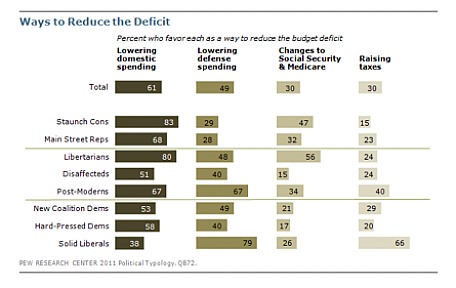In my first look at the special election in NY-26 (since partially retracted), I wrote that the Tea Party candidate, Jack Davis, was mounting a strong third-party campaign by attracting “disaffected and conservative voters who would otherwise lean to the GOP.”
By “disaffected,” I meant only that Davis supporters were disproportionately likely to deny affiliation with either major party, and not to recall voting for either Barack Obama or John McCain in 2008 (see here for some relevant polling data). But an interesting post by Jonathan Chait at TNR.com points out that the folks at Pew actually have a category called “Disaffecteds” in their typology of voters—and argues that this group may indeed have been key to tipping the campaign to Democrat Kathy Hochul.
Disaffected voters, in Pew’s terms, are generally socially conservative, economically insecure, less-educated whites. These voters tend to be skeptical about the government’s ability to solve problems, and, not surprisingly, they tend to vote Republican.
But at the same time, they are fiercely attached to Medicare and Social Security—so much so that they are more resistant to changes to those programs than even the key groups that make up the Democratic coalition. Chait reproduces this chart from Pew:

Chait also links to a good bit of analysis from Henry Olsen at National Review Online, who dove into the data on early returns and found that “Davis’s share of the vote increases the less educated the county is”—and in those counties, his gains came at the expense of the Republican in the race, Jane Corwin. Writes Olsen:
The verdict is clear. For whatever reason, the blue-collar independents and Democrats who voted Republican in droves last year did not vote GOP tonight. And many blue-collar Republicans voted for Davis rather than Corwin.
If this analysis is on point, of course, it suggests that the reason for those swings is the Medicare debate—so count this as a bit of support for the conventional wisdom.
There are plenty of caveats, of course: these voter typologies are hardly perfect analytical categories, nor is the experience in a given district at a given time necessarily predictive of what will happen in another district at another time. But as a way of understanding what happened in NY-26, this is a pretty interesting perspective.
Greg Marx is an associate editor at CJR. Follow him on Twitter @gregamarx.
